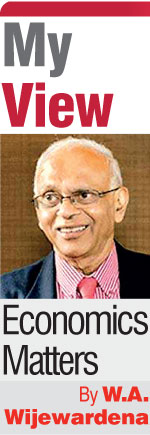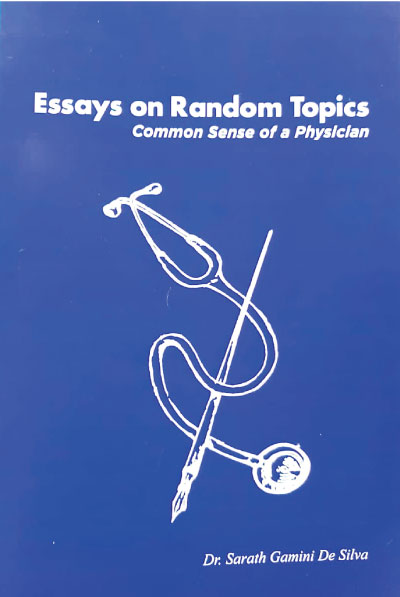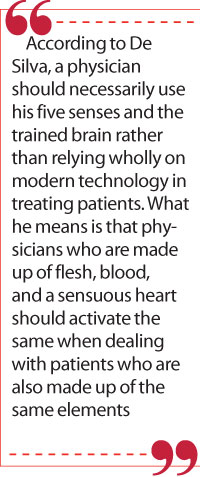Thursday Feb 19, 2026
Thursday Feb 19, 2026
Monday, 9 August 2021 01:34 - - {{hitsCtrl.values.hits}}
|
Dr. Sarath Gamini De Silva
|
A doctor in the publishing business
Dr. Sarath Gamini De Silva, a reputed physician with long experience in the government as well as in post-retirement practice, has reappeared in the publishing business once again with his latest, ‘Essays on Random Topics: Common Sense of a Physician’, released a month ago. This is the fourth of his publications.
The present volume contains 30 middle length essays which he has written for over a decade, some of which have been previously published in newspapers or journals. The topics cover diverse subjects of current interest, namely, contemporary Sri Lankan society, its religion, culture, education, youth development, language issues, healthcare system, and politics.
The message he has delivered in them are loud and straight, free from bias, prejudice or affiliation to any sect. They convey his independent reading of topics nurtured and strengthened by observation and inference.
Old school discipline: Hard work is key to success
De Silva belongs to the old school that gives a high value to discipline. Discipline is a composite attribute representing several human qualities: commitment, dedication, humility, humbleness, and flexibility. Those who are disciplined in this manner do not see an easy way to attain success.
Success comes, as the old guard in Singapore that elevated that country from the third world to the first world within a generation had believed, through hard work done by citizens at all levels, students at schools, undergraduates at universities and technical colleges, and workers at workplaces. This discipline, accompanied by openness and ability to appreciate social changes with equanimity, is evident in De Silva’s essays in this volume.
 Medical practitioners should be versed in both science and art
Medical practitioners should be versed in both science and art
In a speech at the prize-giving day of the Royal Institute in 2015, De Silva has articulated this vision as follows: “You may have heard your elders referring to the ‘good old days’. You may have heard them say how much better their livelihood was, with less stress, less competition at school entry or at exams, more time to relax or take part in sports, etc. Yet the truth is that most of us in the older generation today are envious of the fun present-day youngsters are having. There were times I myself felt ‘Oh how nice if I were born a few decades later’.”
He has not stopped there. While admitting that those in the medical profession are making an uphill battle to maintain the traditional values in medicine, De Silva has told the students that a medical practitioner should be versed in both science and art. Science will help them to make proper diagnoses. Art will help them to deliver permanent cures to patients.
He has also made a comment on new technologies there. Technology should be a blessing. But students should learn how they could acquire wisdom to understand what it offers. The role of education should be to prepare students to gain this capability. He has also coaxed students to learn English not to show their supremacy to others but to gather a better world outlook.
A good mentor in love with his protégé
In an article he had penned to Colombo University’s Student Medical Journal in 2008, De Silva has confessed that he had been a hard taskmaster to students and doctors in his clinical unit at the hospital. This is how he has explained it in his own words: “The medical students and doctors in my unit know that I always discreetly point out any irregularities in the dress, posture, words used, the grammar, etc. Recently, I had to correct the way a postgraduate doctor was standing during the ward round and pointed out the fact that the tie did not match the multicoloured shirt. These I feel are matters many would have ignored. Yet I strongly feel that they are important in the making of a complete doctor. It is heartening to note that all my advice is taken in the correct spirit.”
This is in fact correct mentoring and it is the duty of the mentor to mould the protégé in the correct shape. But like a good mentor, his style of moulding those being mentored has been not to tell them about their weaknesses in front of others. Instead, he had done so at specially arranged one-on-one personal meetings.
 A candid plea to fellow physicians
A candid plea to fellow physicians
In 2003, De Silva was inducted as the President of the Ceylon College of Physicians. In his address at the induction, he pleaded the fellow physicians to make a self-discovery by looking at the mirror. Drawing the attention to the shortcomings of the medical profession, he has said that a problem is not a problem if it did not have a solution. Hence, the profession should find solutions to the existing problems.
Given that Sri Lanka’s resource base is scanty, he has said, “It is time that we started making the best use of the meagre resources available to us, while asking the authorities to provide us with whatever is possible. Let’s be brave enough to change what can be changed, humble enough to accept what cannot be changed, and most importantly, let’s be wise enough to see the difference.”
What this means is that instead of trying to solve all the problems under the sun, a list of priorities should be prepared, and the scarce resources should be used to resolve them. Such a move is in line with the best practices of public policy.
A physician should be of superhuman qualities
The gap in the knowledge between a physician and a patient has narrowed significantly today, De Silva has said in his oration. If a physician does something wrong, he is subject to penalties by courts of law. Hence, physicians cannot abandon the sacred principles and ethics which they should adhere to when treating patients. Despite the superior information available to the patient, he is helpless in the hands of the physician.
Now, De silva advises his fraternity as follows: “This is the reason why there is a tremendous obligation on the part of the doctor to see that he does the best for his patient. He is expected to do his best to arrive at a diagnosis and then prescribe the medicine that is most appropriate for him. This very fact that he is totally at the mercy of the doctor makes him demand that the doctor behaves almost in a superhuman way.
“In defence of our weaknesses, we argue that we are also human beings, that other segments of society are also corrupt, but people do not complain about them, and lawyers charge much higher fees but no one protests, etc. All these arguments become invalid as our function in society is at a much higher plane. Thus, we have to act superhuman and be a lotus blooming out of the muddy waters.”
Value of human touch in treating patients
De Silva has emphasised the value of the human touch in a physician’s relationship with a patient. Modern technology though it has helped physicians diagnose illnesses faster and more accurately, has created a distance between the two parties. He therefore has said that physicians should realise that medicine is science as well as art. His motto is that ‘science will cure the patient faster, but art will make him feel better’. Any curative treatment should be a combination of both these qualities.
Hence, according to De Silva, a physician should necessarily use his five senses and the trained brain rather than relying wholly on modern technology in treating patients. What he means is that physicians who are made up of flesh, blood, and a sensuous heart should activate the same when dealing with patients who are also made up of the same elements.
Shouting out against improprieties
Though De Silva is a physician, he had not been silent when he had seen improprieties in his profession or in society. In these cases, he had spoken loud and straight. One such case is his open letter to the President of the Government Medical Officers’ Association, better known as GMOA. It is a short letter, but it has conveyed in the strongest language what he had felt as an impropriety on the part of GMOA. This he had written as a senior physician, a medical teacher, an elected member of the Sri Lanka Medical Council or SLMC, and a former vice president and a long-standing committee member of GMOA.
Having seen with utmost consternation the GMOA resorting to flash strikes even for minor matters putting the public in grave risks and inconvenience, in this open letter De Silva had advised the incumbent President of GMOA that if a trade union has resorted to strike action, it was a sign of the weakness of the trade union. He had voiced this aloud in TV discussions and in public when he was an office bearer of GMOA.
GMOA using muscle power instead of brain power
De Silva’s main contention in this open letter has been the hard stand taken by GMOA against the private medical school, SAITM, and the use of strike action to attain its goal of seeing the closure of that medical school. Since those strikes had caused immense hardships to the public, he had said that those strikes were really a crime committed against society.
In the past, GMOA had used strike action for forcing authorities to resolve the salary issues of members or other issues which were of a more personal nature. GMOA had struck work on several occasions demanding good schools for the children of its members. De Silva had said that in those good old days such strike actions would have been an unthinkable affair. Instead of using strike action as the last resort, GMOA had been using it as the first resort. Thus, instead of using the brain power, GMOA had been using its muscle power to frighten authorities into submission by causing enormous hardships to patients.
Holding patients at ransom
The tradition of GMOA had been not to seek the support of trade unions in other sectors. But this cherished principle had been abandoned by GMOA leadership. Says De silva in this regard: “What happens now is totally unacceptable. GMOA officials publicly calling general strikes in a militant manner is a very bad trend. Doctors going on strike for general political issues like various trade agreements and the like is also totally unwarranted.”
De Silva has continued in his beratement: “For the first time in the history, a political party leader has been allowed to address the GMOA membership. As I already indicated to you personally, this should never have happened. The net result of all this is that in the public eye, GMOA has become equivalent to any other trouble making trade union in the public sector. The public has lost all respect for GMOA and the medical profession in general. It is inevitable that many suspect your actions to be a part of a large campaign to create political instability.”
De Silva had cautioned the incumbent President of GMOA that he had been projected in the country as a ruthless trade union leader ever ready to hold the sick to ransom to achieve his mostly unreasonable demands.
The evil of being in leadership for too long
If anyone had been in leadership for too long, it was inevitable that the joy of power would make him deviate from the main mission of the organisation which he was heading. This was true for all types of leaders, those in politics, business, or religion. The way to prevent it was to introduce governance principles which would encourage voluntary retirement after a given number of years. That had been the guiding principle of GMOA in the past. But with the incumbent President, it had been ignored.
Hence, De silva had politely suggested that the President in question should step down from presidency once his current term expires. This open letter had been written in 2017. The events since then have shown that De Silva’s good counsel as a senior physician had been totally disregarded.
This letter has been published in newspapers and media. It is not known how GMOA had responded to it.
 The misconstrued high literacy rate in Sri Lanka
The misconstrued high literacy rate in Sri Lanka
In an essay on high literacy of Sri Lankans, De Silva has argued that the literacy rate was not an index to gauge the general intelligence level of people. The disappointed De Silva says: “The way the educated people behave with lack of wisdom, common sense, or simple logic leaves much doubt about the quality of education we receive. This no doubt is the result of examination-oriented, book-based education that is being delivered over the years. Vast majority fails to analyse a simple problem or to overcome a minor deviation from the norm in their day-to-day life.”
But there is hypocrisy in some of the so-called intellectuals who do it purposely. According to De Silva, the actions of many politically aligned lawyers during the constitutional crisis of October 2018 were a case in point. They had explored all the loopholes in the law to justify the unconstitutional act of the then President. This was subsequently proved by the unanimous verdict of the Supreme Court on the issue.
Evil of medical professionals playing political games
According to De Silva, medical professionals too have been to this political game as explained in the essay on ‘Science, Non-science and Nonsense’. This they have done so with no concern for the health and the wellbeing of the nation.
De Silva has documented several such instances from the recent past. One was the banning of the weed killer glyphosate on the ground that it was the cause of the chronic kidney disease of unknown origin rampant in the North Central Province in the country. Another is the issue of sterilisation of women without consent in Kurunegala propagated by monks and medical men with no expertise in women’s health. A third is the promotion of a scientifically unproven native medicine for the current COVID-19 pandemic.
A fourth is the endorsement of compulsory cremation of those died of COVID-19 with no regard for diverse religious practices. A fifth is the instance of doctors trained in allopathic medicine coming on public media and promoting various traditional medicines yet to be scientifically proven. Since this nonsense is uttered by qualified medical practitioners, the gullible people easily become victims. This happens when they breach the code of conduct which they should adhere to when performing their duties as professionals.
A book worth reading
The essays contained in De Silva’s current publication are a good read. They permit readers to have a peep into the sacred medical profession as well as contemporary political issues. They have been penned in lucid and flowing language so that the readers would not get bored halfway through reading them. I recommend this publication to all readers.
(The writer, a former Deputy Governor of the Central Bank of Sri Lanka, can be reached at [email protected].)